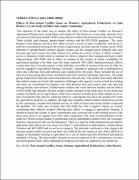| dc.description.abstract | TEREKA STELLA (2011-M092-20048)
Effects of Post-Armed Conflict Issues on Women’s Agricultural Productivity in Gulu District: A Case Study of Palaro Sub-county Community.
The objective of the study was to analyse the effect of Post-Armed Conflict on Women‟s Agricultural Productivity, using Palaro sub-county in Gulu district as a case study. Specific focus was given to three post-armed conflict issues that are evident and pronounced in the area of study. These include land disputes, gender-based violence and the HIV/AIDS pandemic. The study looked at land disputes and how they affect women‟s access to land. Availability and access to land has a tremendous bearing on the extent of agricultural activities that the women can do. With reference to gender-based violence against women and the unequal power relations that exist between men and women, the study looked at it within the context of how it affects women‟s access to financial credit which is essential for them to improve their farming and lead to their empowerment. HIV/AIDS and its effect on women in the context of labour availability for agricultural farming is the other issue the study explored. HIV/AIDS disproportionately affects women than men. From the analysis of the field data, over 80% of women in the area of study are actively engaged in agricultural farming. Generally, a qualitative approach with a combination of other data collection tools and methods were employed for the study. These included the use of data from focus group discussions, household interviews and key informant interviews. The target group comprised of both men and women between 18 to 60 years. The results of the study indicated that indeed women are faced with numerous challenges with regard to access to land for farming and these are exacerbated by disputes over land between men and women, men and men and among families and relatives. Gender-based violence that exists between families and the effects of HIV/AIDS also intensify the post-armed conflict situation in the study area. It was found that women can hardly access agricultural credit from commercial banks given their limited access or lack of properties like land for collateral which is a prerequisite for one to be availed with credit for agricultural purposes. In addition, the high rate of gender related violence directed at women in the community, coupled with limited sources of credit in Palaro sub-county further compound the problem. The study also revealed that HIV/AIDS has had a negative impact on women considering their reduced numbers affecting their ability to engage in agricultural farming. It should be noted that women in these communities play a pivotal role in the farming process with most times little or no support from their male counterparts The main recommendations of the study are; Acholi cultural leaders in partnership with all stakeholders should review the customary land laws and practices that are discriminatory. There is a need for multi-dimensional and holistic approaches that address the root causes of women‟s vulnerabilities to land disputes, Gender-Based Violence and HIV/AIDS and as well as its impacts. The principle conclusion is that coping with the post-armed conflict recovery has been very difficult for the women as they find it difficult to engage in meaningful farming or agriculture as a way of improving their livelihood and general standards of living. The post-conflict situation is always expected to be a resettlement, recovery and development phase where meaningful livelihood activities are supposed to be carried out.
Key Words: Post-Armed Conflict, Issues, Women, Agricultural Productivity, Gulu District | en_US |


